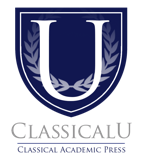Teaching the Great Books
-
Introduction
Teaching the Great Books: Course Introduction (Preview Content)4 Topics|1 Quiz -
LessonsLesson 1: What Should We Read? (Preview Content)4 Topics|1 Quiz
-
Lesson 2: How Should We Read the Classics?4 Topics|1 Quiz
-
Lesson 3: How to Do Deep Reading5 Topics|1 Quiz
-
Lesson 4: Ancient and Modern Modes of Interpretation4 Topics|1 Quiz
-
Lesson 5: How to Teach Great Books—Part I4 Topics|1 Quiz
-
Lesson 6: How to Teach Great Books—Part II5 Topics|1 Quiz
-
Lesson 7: Classroom Habits and Practices4 Topics|1 Quiz
-
Lesson 8: Who Do We Teach?4 Topics|1 Quiz
-
Lesson 9: Students Afflicted with Acedia or Ennui2 Topics|1 Quiz
-
Lesson 10: Helping Students Overcome Acedia or Ennui2 Topics|1 Quiz
-
Lesson 11: Who Is the Teacher?2 Topics|1 Quiz
-
Class ObservationsLesson 12.1: Observe 7th Grade Classroom (with pre-class interview)
-
Lesson 12.2: Observe 7th Grade Classroom (with class session)1 Topic
-
Lesson 13.1: Observe 10th Grade Classroom Day 1 (with pre-class interview)
-
Lesson 13.2: Observe 10th Grade Classroom Day 1 (with class session)
-
Lesson 13.3: Observe 10th Grade Classroom Day 1 (post-class interview)1 Topic
-
Lesson 14.1: Observe 10th Grade Classroom Day 2 (with pre-class interview)
-
Lesson 14.2: Observe 10th Grade Classroom Day 2 (with class session)
-
Lesson 14.3: Observe 10th Grade Classroom Day 2 (with post-class interview)1 Topic
-
Lesson 15.1: Observe 10th Grade Classroom Day 3 (with pre-class interview)
-
Lesson 15.2: Observe 10th Grade Classroom Day 3 (with class session)
-
Lesson 15.3: Observe 10th Grade Classroom Day 3 (with post-class interview)1 Topic
-
End of Course TestEnd of Course Test: Teaching the Great Books1 Quiz
Education via Humility
In Plato’s Apology, after the Oracle of Delphi declares that Socrates is the wisest man, Socrates decides to test this conclusion. He compares himself to others who are supposed to be wise, saying, “Well, although I do not suppose that either of us knows anything really beautiful or good, I am better off than he is–for he knows nothing, and thinks he knows; I neither know nor think I know. In this latter particular, then, I seem to have slightly the advantage of him.” What Socrates is saying here is that those who are wisest are the ones who know just how little they actually know. This is why the Socratic method is so valuable. If we must recognize our own ignorance in order to be wise, asking questions seems the best way to educate. When a teacher asks questions of a text instead of pontificating about it as a master, the teacher shows the students how to be wise. Josh Gibbs says that a teacher must approach a book with the mind-set of a student, not a master, and Socrates’s method of questioning seems to be just that.




